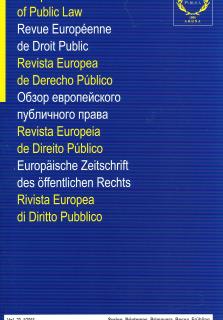
Les concepts et mÉthodes de raisonnement du nouveau droit public
Conclusions gÉnÉrales
(The Concepts and Methods of Reasoning of the New Public Law
General Conclusions)
Examining the concepts and methods of reasoning of the new public law leads to putting into perspective several decades of significant developments of public law within European states in order to determine to what extent, beyond the permanence of words, a profound transformation is taking place, revealing a new public law, new because it is being fundamentally renewed or reestablished. Neither having, in any way, the ambition to be exhaustive, nor to present a full record which would obviously be premature, it seems possible to draw two conclusions: the foundations of public law have changed profoundly, leading to a renewal of its functions. Marked, following the advent of the Rule of Law, by a new aspiration towards the emergence of a society of law, public law explores new fields in which its traditional legitimating and regulatory functions are being significantly reconsidered. Whatever might be one’s view on these transformations, their reality is undoubtful and the jurist’s role, after having presented them, is to try to identify the rules and principles guaranteeing that, restructured, the new public law remains ordered.
S’interroger sur les concepts et méthodes de raisonnement du nouveau droit public conduit à mettre en perspective plusieurs décennies d’évolutions marquantes du droit public au sein des Etats européens afin de déterminer dans quelle mesure, au-delà de la permanence des mots, s’opère une mutation profonde révélatrice d’un droit public nouveau parce que fondamentalement renouvelé ou refondé. Sans nullement prétendre à l’exhaustivité non plus qu’à un bilan qui serait, à l’évidence, prématuré, il semble possible de dresser un double constat: les fondements du droit public ont subi une profonde mutation, conduisant à ce que ses fonctions se soient renouvelées. Marqué, dans le prolongement de l’avènement de l’Etat de droit, par une aspiration nouvelle à l’émergence d’une société de droit, le droit public explore de nouveaux champs dans lesquels ses fonctions légitimante et régulatrice traditionnelles sont significativement repensées. Quel que soit le regard que l’on porte sur ces mutations, leur réalité ne fait aucun doute et le rôle du juriste, après les avoir exposées, est de s’essayer à identifier les règles et principes garantissant que, restructuré, le nouveau droit public demeure ordonné.





















